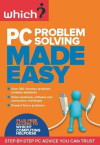Our first impressions of PC Problem Solving Made Easy was that it reminded us of the 'computer clinic' sections that you will find towards the back of any monthly computing magazine. You know the sort of thing where a reader writes in and says "how can I get text to fit on the page properly when printing?" and the magazine provides a brief step-by-step answer. Indeed, that very question appears on page 68 of the book, and is answered in three steps: checking paper and font sizes, setting margins and checking document size.
First impressions can be deceptive though, and after reading through the 224 pages of advice provided by writers from Which? (a consumer association in the UK which is now 53 years old) we found ourselves getting frustrated at the simplicity of much of what it has to offer. The back cover promises "step-by-step instructions for fixing all the most common PC problems" which is a rather bold, rash even, claim to make. Both the problems being raised, and often the solutions being proposed, are too simplistic to be truly useful. By way of example take "my web browser isn't working correctly" which, as a question goes is far too generic and lacking in specific information to be useful. You need to define exactly what isn't 'working correctly' for a start, and when the answers provided apply just to Internet Explorer then it is immediately irrelevant and unhelpful to all those people using Firefox or Chrome. Even for Internet Explorer users the advice is a little bit scattergun: disable add-ons, run the Microsoft Malicious Software Removal Tool, and finally reset and/or update Internet Explorer.
Which highlights the biggest single problem that this book, and any similar title offering step-by-step simple advice faces: namely the Internet. PC problems are rarely broad and generic, and the stereotypical 'have you tried turning it off and on' advice is rarely applicable. Similarly, books can never hope to provide the level of specific help that an online support forum can and the publisher appears to acknowledge this as it announces on the front cover that purchasing the book also gives the buyer free access to the online Which? Computing Helpdesk. Yet there are plenty of online support forums, such as DaniWeb, that provide free help to anyone who needs it.
The advantages of a dynamic, interactive and community-based support resource are as obvious as they are many: a two-way conversation that adapts to your needs rather than a narrow take it or leave it solution, access to a huge array of experts covering many more subject areas than a 200 page book can achieve, ongoing support and advice with your problems, individual solutions which are tailored to your experience level and talk in your language instead of having to assume a lowest common denominator approach, answers that address your specific needs rather than adopt a broad and generic tone to name but a few.
The book could be useful reference for a total PC newbie, with the initial hardware problems trouble shooter offering the kind of advice that any geek will be used to handing out to computer illiterate friends and relations: system startup, OS startup, display and sound problems and so on. Towards the rear of the book, the 'Keep Your PC Healthy' section offers equally useful basic advice for backing up data, creating a system repair disc, reinstalling Windows 7 and so on. The trouble is that the hundred and fifty or so pages in between are just too generic to be truly useful as a problem solving resource for most people. As such, we have to admit that the book fails to deliver on the practical and time saving front as it's far more practical and takes a lot less time to Go Google...
